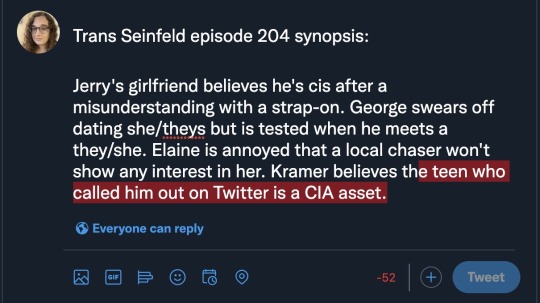Text
honestly here's a shout out for everyone dealing with the less discussed or sympathized with aspects of adhd because that shit is tough and i'm just proud of you for doing the best you can. shout out to everyone who struggles to take care of themselves and their surroundings because they forget or can't bring themselves to eat, clean and put themselves to bed at a reasonable time. all my love and support to everyone who consistently misses important appointments and deadlines because they forgot or got the time or date wrong or got distracted while getting ready and ended up being too late. and if you regularly misplace things and end up dealing with crushing anxiety and humiliation when you can't find them i care about you. adhd is a disability and you're not a bad or lazy or inherently flawed person for struggling because it's making your life harder. and i know it's not easy to get help when it literally interferes with your ability to seek it out, but i'm rooting for you. i want us all to get better. i'm just glad you exist and i hope we all make it.
5K notes
·
View notes
Text
“You have to cheat. Ask for as many extensions on papers as you possibly can. Pretend your computer is broken. Use your charm if you have any. If you’re going to cry, don’t wait until you’re out of the room–do it where the people in power can see you. Eat the same food every day if you can’t think of anything else to make. Put other things ahead of taking a shower, even if your mom said you have to take a shower every two days. Sometimes people won’t notice you’re cheating but even if they do and are annoyed you might still get by. My mom goes to workshops for people with ASD and then gives me the really long printouts that go along with them. The printouts tell me to sit down and make a list of everything I have to do. When I am anxious, as I have been this year, it’s hard to think about these things so I hold on to the printouts out of guilt but don’t actually read them. Then my mom finds them and gets upset that I haven’t read them and says that I’m not ready to live on my own. But I am ready to live on my own. Badly. Just like I can hold down a full-time job. Badly. Just like I am getting my homework done. Badly. And I forget to balance my checkbook, which none of my non-disabled friends do because you can get it online, and my mom says, “Well it’s different for you because they would be able to do it if they needed to, but you wouldn’t, so you have to do it.” Theoretically I understand this is true, but my checkbook remains unbalanced. Which is bad. And I feel bad. I do! At this rate I’ll never be able to go to college. But I do go to college. At this rate I’ll never be able to have any friends. But I do have friends. I just don’t do everything right with them all the time. For people whose lives are controlled by executive dysfunction, I firmly believe the difference between getting stuff done and not getting stuff done is not caring about doing things right. You cannot always make a list all the time and be early for everything. You just can’t. Hopefully you’re good-looking or funny or you remind someone of their niece. Exploit all opportunities. Do not do what people who are not disabled tell you to do (unless you want to, of course). All too often I find myself waiting for the day when I can do shit properly, which more or less amounts to waiting until I’m not disabled anymore. Then I can feel good enough to deserve everything I want. Well my cure is slow in arriving, so I’m just going to do everything I want now, if that’s okay with you.”
—
from I’m Somewhere Else, “Max is a Miracle”
The best advice I’ve heard on how to get through college with a developmental disability when there are zero accommodations for executive dysfunction. You can’t let anyone else try to live your life for you, and you cannot worry about “doing things right”. Also: none of the things described here as “cheating” are ACTUALLY cheating.
43K notes
·
View notes
Text
What to do when you’re having a poor executive function day/been sitting in front of your computer for a few hours wondering why you can’t do your work:
1. Take a deep breath - Let out all that anxiety over the project you’re doing so you can think clearly
2. Pull up a clean sheet of paper and something to write with - You can use a fresh word doc, new page in your journal or planner or whatever else works for you, the idea is that after this you will have a physical list to look at to help keep you on task.
3. Identify your obstacles (i.e. What is keeping you from doing this task?) - For example: Is it scary? If so, why? Does it feel too hard? Is there something else that you feel needs to be done first? Write these down!
4. Plan how to overcome your obstacles - This can take some creativity and some thinking to best figure out how to overcome the obstacle. I’ve included examples below for potential plans.
Example 1:
Obstacle: I don’t know the best way to approach this task.
Plan: Brainstorm on paper ways that you might be able to approach this task. Google ways to accomplish this task. Review lecture notes or example homework problems on how to accomplish this task. Ask a friend/coworker/classmate how they might start the task. Write down everything you feel might be relevant until you feel like you know where to start and where to go.
Example 2:
Obstacle: This feels too big and overwhelming so I don’t want to do it.
Plan: Break down the tasks into smaller, tiny tasks. Make them as small as you need to make them feel manageable. Write down all these tasks check them off as you go.
Example 3:
Obstacle: I’m waiting for someone to get back to me with comments on this project but they’re taking too long.
Plan: Follow up with this person and identify what you can do without their comments. For example, if you’re waiting for someone to sent you a section of a project or paper, write your section to the best of your ability. Can you have someone else review this project and still get good feedback. Or tell yourself you’ll revise/edit your project and integrate their comments later when you get to them. Often when I identify what feels out of order, I can move past it or put it farther down my list so I’m no longer just stuck waiting.
5. Encourage yourself and commend yourself for filling in the gaps actively that your brain couldn’t do on it’s own today. - You’re doing a great job!
Sincerely,
A Graduate Student with Adult ADHD
14K notes
·
View notes
Text
here’s another adhd resource i have saved: its a list of academic strategies for people with adhd
i particularly like it cause of how its framed (ie. listing things you can do rather than implying you should be doing things a certain way)
8K notes
·
View notes
Text
that specific and very surreal emotion when youre in a genuinely SPECTACULAR mood bc youre indulging a lot in your hyperfixation but, separate from that, youre having a lot of trouble keeping up w a basic self care routine and simple responsibilities bc you just cant bring yourself to care much about them, so you have this background radiation of feeling kinda lazy and useless but you don’t actually think about it consciously much bc you’re too busy having fun hyperfixating

35K notes
·
View notes
Text
i know vitamin c basically neutralizes adhd meds but lemonade good
200K notes
·
View notes
Text
A friend sent me this and it made me go HOLY SHIT, IT’S ME!
The often-misdiagnosed adult female autistic phenotype (those assigned female at birth) may appear as the following traits:
• Highly sensitive, intelligent, anxious, easily overwhelmed by environment and socializing
• Good at giving the appearance of social success but struggles to understand and maintain it
• Repetitive movement/behavior that can be well hidden, as “masking” helps them fit in
• Preference for fixed routines and rituals
• Intense special interests that can change over time, extensive knowledge of
certain subjects, often used to escape from stress
• Disorganized or poor eye contact, which can also be “masked” when trying to fit in
• Trouble interpreting nonverbal communication
• Can have a history of changing jobs, majors in school, changing friend groups, moving
• Often perceived by others as a “Luna Lovegood” type: quirky, odd and unique
Sensory
• Sensory processing difficulties can appear as both:
hypersensitivity to light, noise and other senses
hyposensitivity and sensation-seeking
• Poor proprioception, clumsiness, accident prone
• Stimming (self-stimulating repetitive behavior) can appear as fidgeting, leg bouncing, head scratching, massaging self, swaying when standing, humming, cracking knuckles, biting lip, tensing muscles and more
• Sensitive to certain fabrics, may have preference for comfortable rather than fashionable clothing
• Need to be in control of environment: adjust lighting, volume, etc.
• Hypersensitivity to medications, caffeine, drugs/alcohol
• Hypersensitive to certain foods/prone to food intolerances, may be a picky eater and have GI issues
Social
• Often seen as shy and introverted in an uncomfortable setting but can be bossy with a need for order and control in a comfortable setting
• Can be too honest, socially immature, unaware of social rules, have difficulty reading others or seeing their perspective
• May adopt alternative personas, a chameleon who changes personalities according to social setting
• May identify someone who is popular as “socially successful” and try to mimic their behavior, clothing, body language, interests, etc.
• Difficulties with conflict resolution: will people-please as a way to avoid conflict and prone to “burning b ridges” as a way to escape conflict
• Intense relationships or friendships, romantic partner often becomes the “special
interest,” they may require daily verbal reassurance of their partner’s feelings for them
• May prefer friends younger or older to peers their own age, taking on roles as the “teacher” with younger friends or “student” with older friends
• Preference for one-on-one social interactions, may prefer friendships with males as they are easier to understand that female friendship dynamics
• May prefer online socializing to in-person and prefer texting to other forms of communication
Emotion
• Physical and emotional exhaustion from socializing, usually needing to isolate
themselves and recharge after socializing
• May have chronic low self-esteem from feeling different and less successful at life
• Emotional melt-downs/shutting down can occur in response to feeling overwhelmed
• Lacks ability to describe emotions, manage emotions, and read emotions of other people
• Self-medicating with drugs or alcohol and/or self-harm can result from inability to cope with feelings
• Difficulty regulating emotions and trouble in relationships can be misinterpreted and are often misdiagnosed as Borderline Personality Disorder, Bipolar Disorder & more
Cognitive
• Highly intelligent and analytical
• Black or white (all or nothing) thinking
• Ability to focus intently but can be easily distracted in overwhelming environment
• Autodidactic, has many self-taught skills
• Perfectionistic, great attention to detail but can fail to see bigger picture
• Takes things literally
• Challenges with executive function, planning, time management, following through with plans
• Difficulty comprehending certain types of humor like sarcasm, may prefer more
obvious, nonsensical humor to other types
• Lack understanding of own identity and how they’re perceived by others
Common comorbidities with ASD
· Food intolerances or allergy (11%)
· Respiratory allergies (19%)
· Skin allergies (17%)
· Anorexia nervosa (23%)
· OCD (30%)
· Depression (20%)
· Anxiety (40-80%)
· Sensory processing disorder (40-80%)
· Sleep disturbances (50-80%)
4K notes
·
View notes
Photo

originally a text post by adhdpie
link HERE
I made an actual flowchart version because I am a visual person and have mediocre abode illustrator skills
14K notes
·
View notes
Text
i KNOW the sleep tips, google. trust me, i know about the darkness and the light and evil screens and exercise and meditation and not napping. i know “”“how”“” to sleep. what i need you to tell me is how to convince my fuckass adhd brain that i need to give up on doing things for the day and that the hours between midnight and five a.m. are NOT secret free extra time that no one will notice if i steal
111K notes
·
View notes
Text
here is a list of questions i have already answered about graduate school!!
please check it before you send me a question about graduate school :) :) i hope it’s useful! xo // updated 08.2019
basic info
what is the PhD and what can you do with it? (+)
what does a literature PhD entail?
should i do a PhD if i have to pay tuition?
does it look bad to take time off between degrees?
what was your timeline like?
what’s the difference between a terminal MA and a PhD? (+)
does getting an MA first help you get into a PhD program?
application process
how can i prepare for applying early in my undergrad career? (+) (+)
where should i start looking for programs?
should i choose a program based on rank or fit? (+)
how many programs should i apply to?
parts of the application
advice on the writing sample
advice on the GRE (+)
how should i ask for letters of recommendation?
how should i write a statement of purpose? (+)
how do i demonstrate my “ability to excel”?
how should i address mental health/family/personal issues that impacted my grades?
grad school application spreadsheet
how should i email potential advisors? (+)
how can i survive the waiting period? (+)
how should i prepare for an interview or phone call? (+)
what should i ask at open house?
what should i do if i don’t think i can afford my grad school tuition?
what should i do the summer before i start my program?
seminars/coursework
how should i plan for grad seminar presentations? (+)
what should i bring with me to seminars?
what are grad seminars like?
how can i get better at speaking during seminars?
reading
what should i have read before i start my lit grad program?
how much reading should i expect?
how can i read a lot without getting overwhelmed? (+)
how can i read efficiently? (+) (+)
quals-specific reading advice
how should i take notes on critical articles?
writing
how do i write a lit review?
how do i write an indicative bibliography?
how do i choose a dissertation topic? (+)
how do i plan for a long research paper?
how do i balance all the different kinds of writing i have to do?
money
how do finances work in grad school?
what is adjuncting and why does it suck?
how can i budget while on a stipend?
should i work while in grad school? (+)
fellowship, postdocs, & job stuff
how do i think up a second project when i’m not even done with my dissertation?
CV writing tips
which websites post US fellowship/postdoc/job ads?
how do dissertation fellowships work?
tips for grant, award, & fellowship applications
misc
will grad school make my mental health issues worse? (+)
how do i survive conferences?
how should i deal with burnout? (+)
i think i want to quit
my advisor is ghosting me
how do i work with no structured schedule?
how do i get enough sleep?
how do i balance my work & my teaching?
how can i beat imposter syndrome? (+)
how can i excel in grad school?
6K notes
·
View notes
Text
Dyscalculia is a learning disability, a lot like dyslexia, but with math and numbers. Everyone knows what dyslexia is, but for some reason, dyscalculia isn’t as well known. I want people to know about this so no more kids are gonna believe uneducated adults who tells them that they’re just lazy and no more kids are going to think they’re just hopeless idiots when they try and try but just can’t understand. It happened to me, and I won’t let it happen to anyone else.
79K notes
·
View notes
Photo
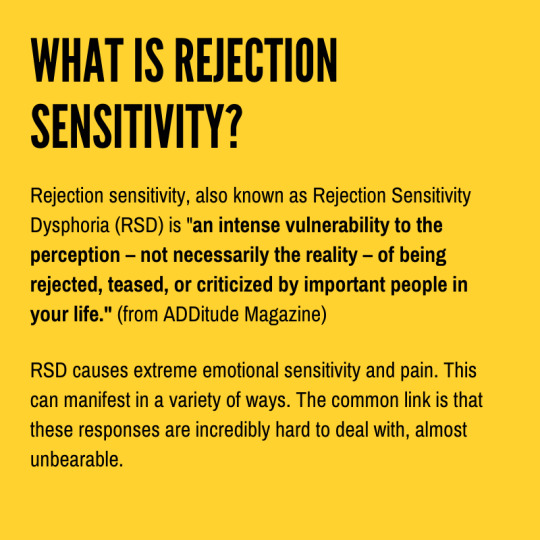
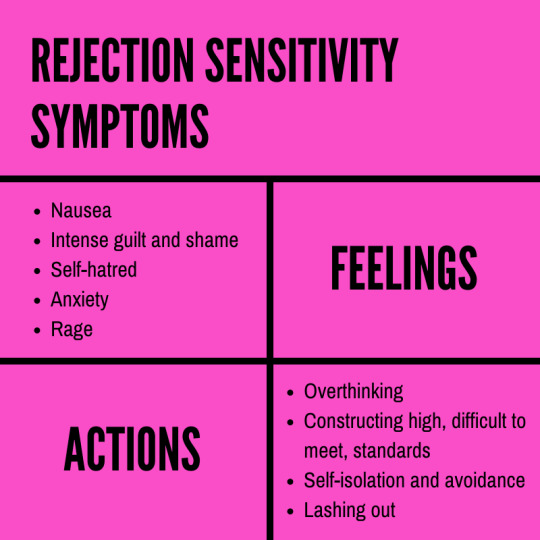
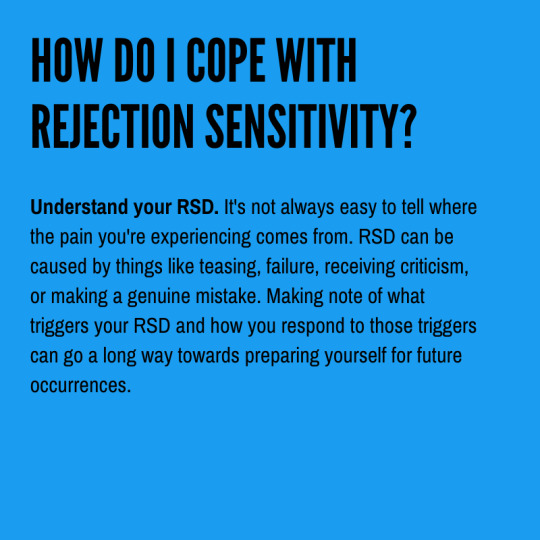


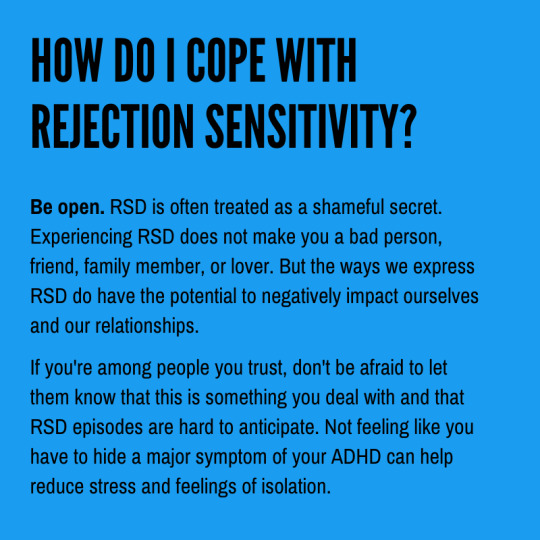
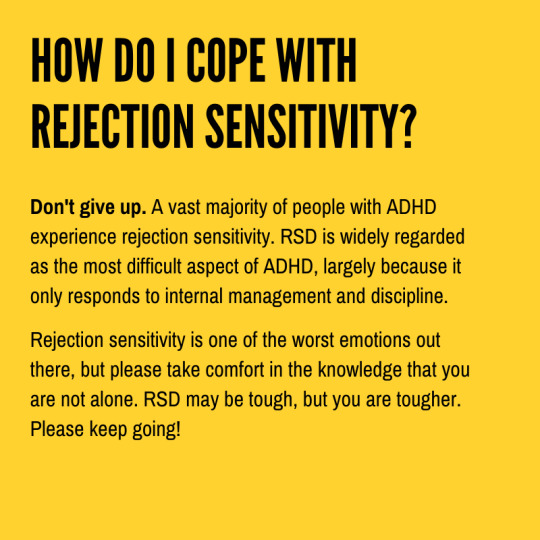
Hey!! I’m super nervous about this but ADHD Awareness Month is winding down and I really wanted to share some information on rejection sensitivity before it ended. This is a defining feature of ADHD that is often overlooked, despite how harrowing it can be for those of us who experience it! My main goal here was to remind my fellow ADHDers that they are not alone!
The transcript version of this guide can be accessed here.
Lastly, ADDitude Magazine is a great resource for learning more about RSD and other ADHD symptoms. Happy friday!
40K notes
·
View notes
Text
me: *is faced with a distressing situation*
brain: *shuts down*
me: no maybe we should actually deal with this
brain: ✔️read 7:26pm
339K notes
·
View notes
Text
GOD I found another article about why ADHD kids say “I don’t know” so much. my entire childhood was getting yelled at for doing some ADHD shit and me not being able to offer an explanation when asked why I did something.
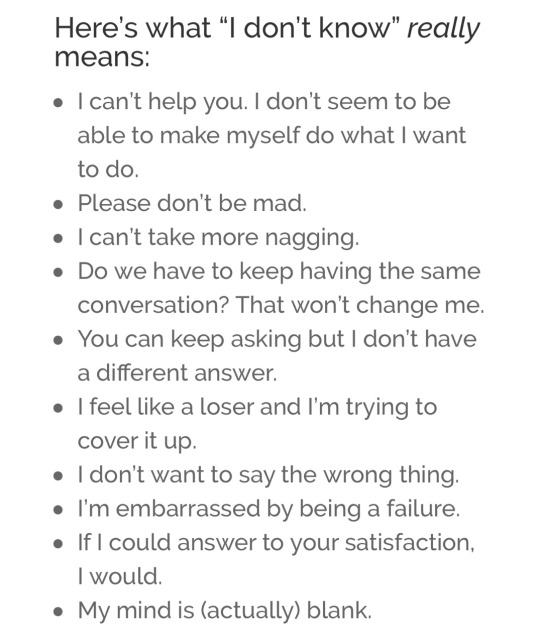

174K notes
·
View notes
Text
adhd mood: that feeling when u forgot something but like u Just forgot it so theres this fuzzy place in ur brain where it was 2 seconds ago and u try to grab it but u cant quite get it and its like trying to grab mist
59K notes
·
View notes
